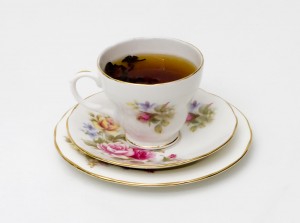Honoring 11th Anniversary of 911
Under the bright blue cloudless sky, waving American flags line the parking lot of the high school up the street. It’s a beautiful sunny morning and the flags are there to remind us that today is September 11, 2012, the 11th anniversary of the terrorist attacks on the World Trade Center and the Pentagon. I also hear church bells ringing loudly, cars honking, birds chirping, children laughing, and airplanes roaring above as if my senses are on high alert.  It’s an ordinary day, but it’s not.
It’s Tea Time!
“A woman is like a tea bag. You can’t tell how strong she is until you put her in hot water.â€
I didn’t make that up. Eleanor Roosevelt did. But the analogy is truer than ever. Women are a powerful force in the world today. We are no strangers to adversity, or hot water, either. When given the opportunity, women work together like an infusion of exotic teas to enrich the Jewish community and future generations. Nishmah is blending these two things—tea and purpose—at a stimulating get-together that you won’t want to miss.
What I Learned From Oprah
As I steam out the wrinkles in Jack’s blue confirmation robe, I’m feeling kind of melancholy. My 16-year-old son has completed another course of study in Judaism and is officially considered an adult member of the Jewish community—turns out he wasn’t quite a man yet at 13 when he became a bar mitzvah three years ago.
Continue reading
Teen Brain Baffles Parents
Being a teenager is tough, and so is parenting one, especially in today’s fast-paced, high-tech world where, for the first time, kids are the ones teaching us about social media and how to navigate our way into the future. Honestly, without their help, I’d never figure out how to operate the television remote control or know how to add new contacts into my cell phone. Teenagers consider themselves masters at multi-tasking. They do homework while they watch television, text their friends, play on the computer, and listen to music, all at the same time.
“It helps me relax and focus on my studies,†says my son Jack, 15, who used to collect baseball cards and now accumulates apps on his iPhone.
Whatever.
Continue reading
Children On Loan From God, and There’s No Exchange Policy
Some parents live vicariously through their children. When it comes to their kid’s success, some moms and dads take it personally. When it comes to their child’s failures, they take that personally, too. I guess some parents figure that if they didn’t get it right the first time, that is, in their own childhood, then surely they can get another shot at perfection when they raise their own son or daughter. Continue reading
Sounds of the Shofar: God’s Wake-Up Call to Parents
The memorable sound of the shofar is a highlight of Rosh Hashanah, especially for children who wait patiently through the songs and prayers of the service. As a young girl growing up in a reformed temple, the sharp, loud sound of the ancient ram’s horn was my signal. It told me that the service was almost over, which meant that I finally could eat bobka and change out of my itchy dress. Today, I still look forward to hearing the first blast of tekiah, but for a much different reason. Now that I have children of my own, the unique sounds of the shofar represent a new beginning, not an end, to something special. Continue reading
Being Jewish Usually Means Dressing the Part
As I struggle everyday to pick my battles with my children, I usually surrender in the wardrobe war. In fact, I let my 11-year-old son Jack and seven-year-old daughter Sari wear what they want for the most part. Jack’s usual attire consists of a Hanes undershirt and athletic shorts. When he dresses formal, he hangs a shark’s tooth around his neck. Sari, on the other hand, showcases more outfits than my fat and skinny clothes combined. Still, she grabs the same striped pink tank top and ruffled skirt every time. Whenever I suggest that she wear something different, she looks at me like I’m as outdated as a taffeta prom gown. Continue reading
Food for Thought: Make the Most of Your Moment
With the kitchen table as my laboratory, I like to experiment with my husband and children. Usually the scientific study involves a new recipe that I want to try on my family before I serve anything edible to a “real†guest. No matter how many times I attempt to make marinated flank steak, the meat is never edible and usually too tough to chew. On the other hand, whenever I get lucky and concoct something particularly tasty, such as a new twist on corn flake chicken, I can’t seem to duplicate the meal the same way again. This drives my taste testers crazy.
I have other tricks up my apron as well. My son Jack, a very picky eater, often prefers the school cafeteria food rather than my own cooking. So when I bake something like three-cheese lasagna, I tell him that I got the recipe from the Rockwood School District. That way, he at least tries the cheesy noodles before he trades in his plate for another peanut butter tortilla.
I find that the kitchen table, which I refer to as my “altar†in a previous column, is also a great place to wet my family’s appetite for something other than tuna noodle casserole. In fact, my goal is to feed their hunger for knowledge whenever possible, or at least get my kids to think about something more significant than the computer game Backyard Baseball. I had the perfect opportunity to serve some food for thought the other day. As I read my parenting bible, Wendy Mogel’s “The Blessing of a Skinned Knee,†I learn about a common question that rabbis ask their students, and that is, “What is the most important moment in Jewish history?†Hint: It’s kind of a trick question, but the answer is so simple. I’m so intrigued that I can’t wait to give my family the same test.
To reward my family in advance for their participation, I toss another handful of seasoned croutons in the Italian salad. Anything crunchy seems to always lift everyone’s spirits. Here goes the conversation:
Me: “I have an interesting question that I want each one of you to give some thought, and then tell me your honest answer while we sit here together and enjoy this delicious mostaccioli.â€
Jack: “Uh oh. Mom must be writing another story because she’s getting weird again.â€
Me: “The question is: “What is the most important moment in Jewish history?â€
Everyone stops chewing for awhile and digests what I just asked them. Finally, my son offers the first guess.
Jack: “The most important moment in Jewish history is when Israel became a state.â€
Sari: “When the Jewish people got Shabbat.â€
Scott: “When God parted the Red Sea. (Now pass the Parmesan cheese please).â€
Grandma Char: “When God gave Moses the Ten Commandments.â€
Me: “According to the rabbi, the answer is: THIS is the most important moment in Jewish history.â€
At first, there’s silence. Everyone looks confused. Then my daughter speaks up.
Sari: “I don’t get it. How can having dinner right now be the most important moment in Jewish history?
Me: “The rabbi means that being together in this moment is all that counts right now. And that whatever happened yesterday or whatever activity is scheduled for tomorrow is not important today. Because all we have is this moment.â€
Sari: “What’s for dessert?â€
“Mishegas of Motherhood†is the creation of Ellie S. Grossman, a St. Louis freelance writer and stay-at-home-mom who never stays home. Her stories are inspired by the real life of her family, including her two children, toy poodle named Luci, and her husband, but not necessarily in that order. Feel free to send any comments, prayers or recipes tow ellie@mishegasofmotherhood.com.
Got a Complaint? A Penny for Your Thoughts
If a child’s greatest strength is indeed hidden inside his or her worst quality, as Jewish wisdom tells us about the yetzer hara, then I’m determined to find the value of my daughter Sari’s kvetvching.
Like many little girls her age, my seven-year-old has the tendency to complain about everything from the seams in her socks to the way I brush her hair. I try to be sensitive to her sensitivities, and I respect the fact that she is very intuitive and mature for her age. However, Sari’s persistent habit has become an art form in both English and Yiddish.
Continue reading
Yetzer Hara: A Child’s Worst Enemy and Best Friend
Stay-at-home-moms are much like corporate executives because we problem solve all day long. We all know this by now, but it’s worth repeating. The only difference is that our boss is four foot tall and considers Lunchables a gourmet meal. And another thing—no one recognizes our everyday accomplishments, big or small, such as the many times I salvage artwork from the bottom of a trash can after it’s already soaked in cream of mushroom soup. Even though we don’t get the same perks as businesspeople, such as expense accounts, office parties, and a private cubicle to call our own, moms are on a fast track alright with no plans to slow down anytime soon.
I always look for creative ways to solve problems. Sometimes I’m worthy of a promotion; other times I deserve to get fired. As a Jewish mom, one of the more challenging, long-term assignments on my agenda is to identify and understand my children’s yetzer tov (impulse for good) and yetzer hara (impulse for evil). As I understand it, the yetzer tov is the angel that reminds us to follow God’s law when we are tempted to do something forbidden. The yetzer hara is more like the devil that stops at nothing to satisfy our personal needs. It’s not necessarily a bad thing though. The selfish desire of yetzer hara that leads us to get married, create babies, advance in business, all make the world go around.
The rabbis in the Talmud period believe that God gives everyone at birth a yetzer tov and yetzer hara. The Talmud notes that both impulses—the self-restraint of the yetzer tov and the burning passion of the yetzer hara—are essential to human survival. How we balance the two forces in our lives describes the essence of free will.
Especially in children, the yetzer hara gets the most attention, at least at my house, because it’s the loudest and most demanding. For Jack, it’s an intense mental and physical focus on the ball field that drives him to pitch another shutout inning. That’s a good thing. His relentless yetzer hara also bullies him, and he can be way too hard on himself if he doesn’t perform his personal best. That’s a bad thing.
For Sari, her yetzer hara is the tenacity to question everything that doesn’t seem right or fair, such as the grading scale that she helped revise in first grade. Any positive change is a good thing. However, the yetzer hara also makes it harder for her to go with the flow. Many times the yetzer hara gets stuck in the negative and shadows the bright side of a situation. And that’s a bad thing.
When guided in the right direction, the rabbis tell us, the energy of the yetzer hara is what gives our child a one-of-a-kind spunk in his or her personality. It’s the fire that burns inside our child, and no parent has the right to extinguish it. The trick is to find our child’s greatest strength hidden inside his or her worst quality. The first step is to look at ourselves in the mirror. Where do you think our child’s mishegas comes from in the first place? Not a pretty sight.
With that in mind, one of my goals is to change the part of my seven-year-old daughter’s yetzer hara that likes to kvetch. So I’ve conducted a family experiment called the “complaint container,†in which we all learn a little something about ourselves. For every complaint we make throughout the day, we put a penny in the pot to get a better understanding of how we all contribute to this problem. Although my parenting technique isn’t necessarily approved by the “experts,†it sure makes a good story. Read how it all went down in next week’s column.
“Mishegas of Motherhood†is the creation of Ellie S. Grossman, a St. Louis freelance writer and stay-at-home-mom who never stays home. Her stories are inspired by the real life of her family, including her two children, toy poodle named Luci, and her husband, but not necessarily in that order. Feel free to send any comments, prayers or recipes to ellie@mishegasofmotherhood.com.



